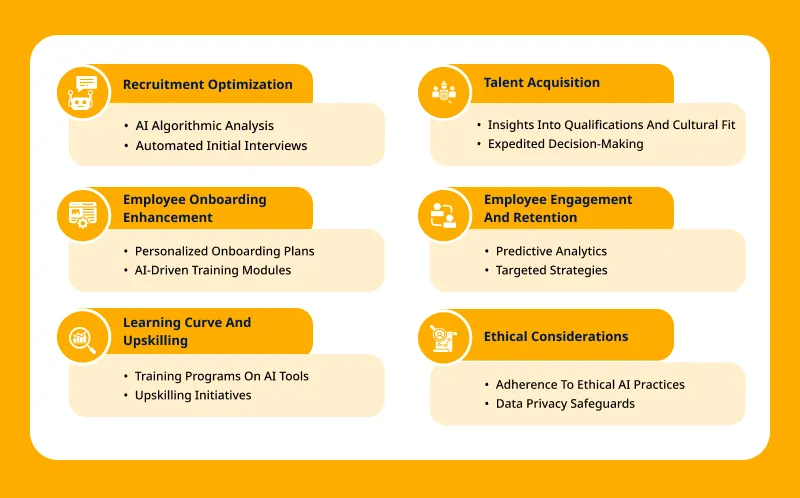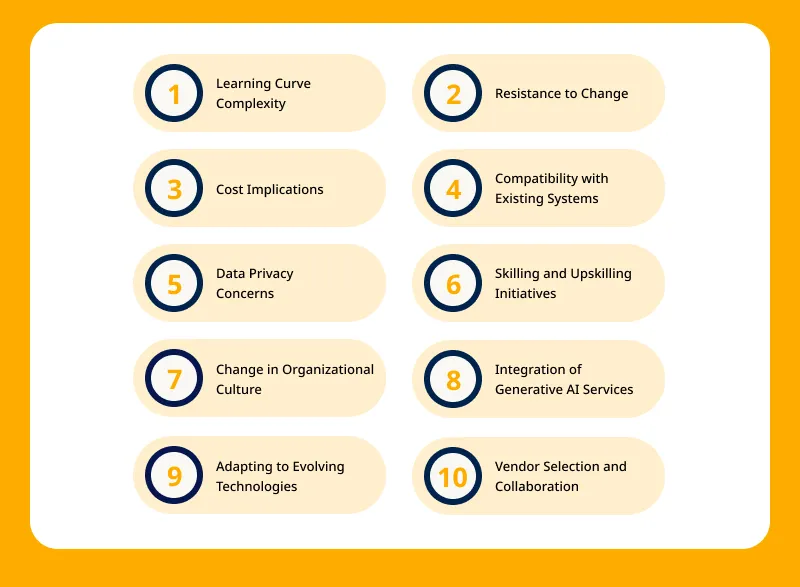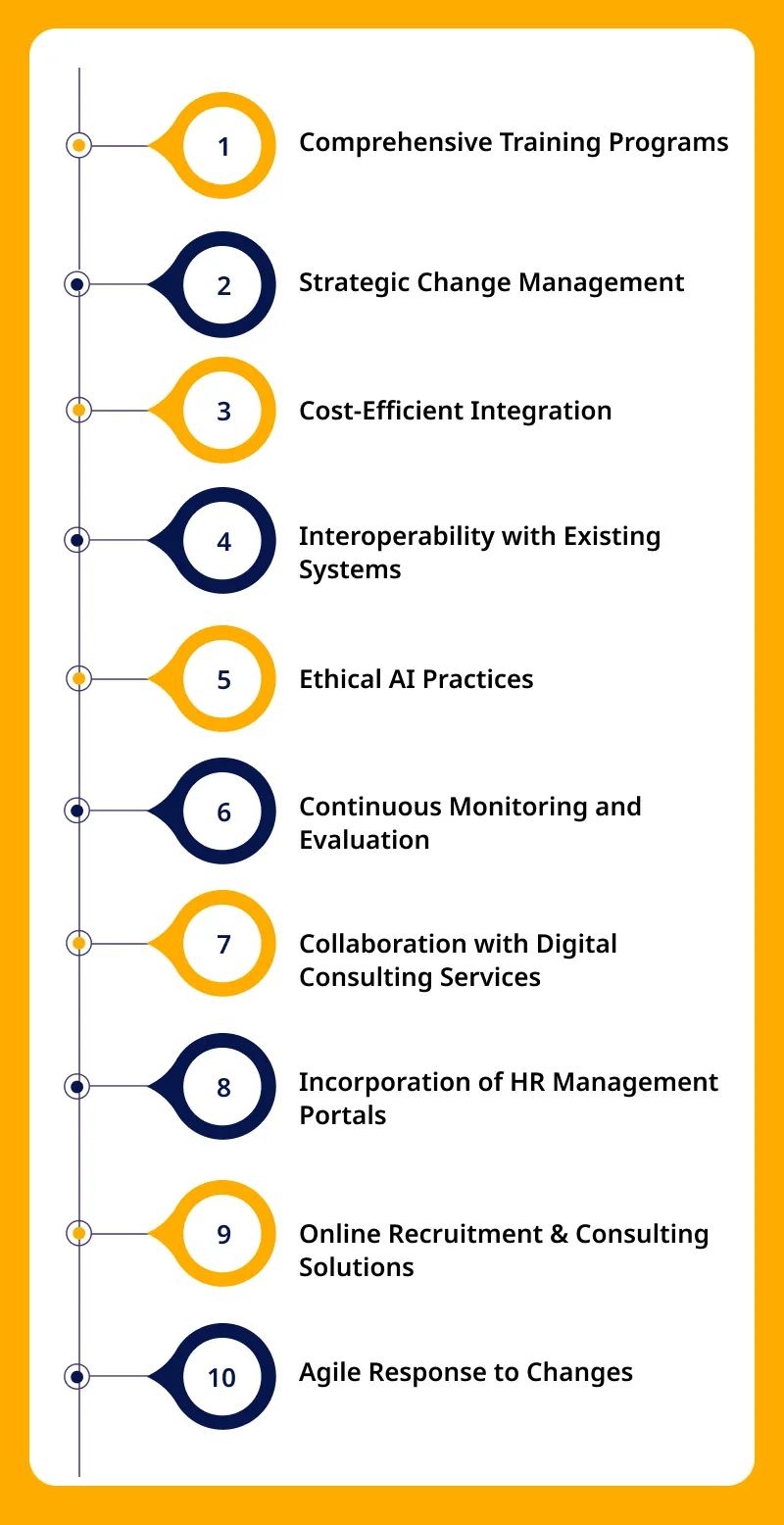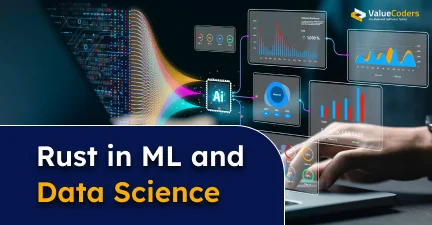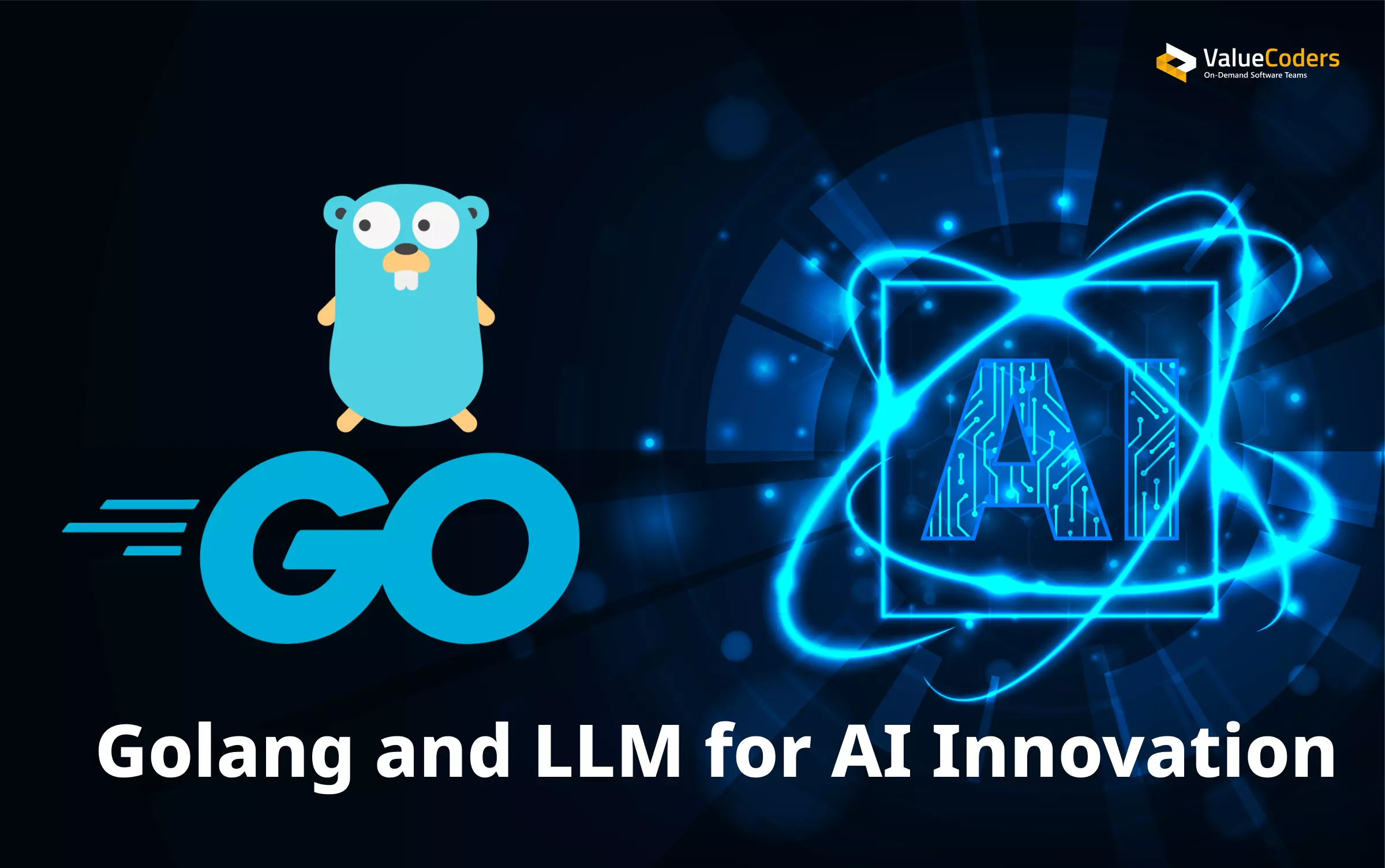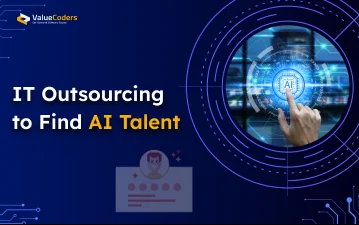Has your HR department entered the age of Artificial Intelligence?
Over 81% of HR professionals report that AI has become vital to remaining competitive in recruiting top talent.
However, fewer feel prepared to implement AI tools effectively. So, how can we leverage AI without getting overwhelmed?
This blog post has the solutions you need! We’ll explore groundbreaking AI applications like automated candidate screening and data-driven retention strategies that are transforming HR operations.
With compelling real-world examples and advice on avoiding common pitfalls, we answer crucial questions like:
❓ How can I use AI for more strategic talent planning?
❓ What’s the best way to upskill my team on AI?
❓ How do I ensure AI implementation aligns with my company values?
Your HR department has the potential to spearhead the AI revolution by adopting a proactive strategy rather than merely responding to it. This blog covers comprehensive insights into AI in HR, encompassing use cases, challenges, and their corresponding solutions.
Understanding AI in HR
In human resources, integrating Artificial Intelligence in HR reshapes traditional practices. AI, a game-changer in workforce management, employs advanced technologies like ML and natural language processing.
Unlock the power of AI in HR for efficient talent acquisition and streamlined processes.
How is AI used in human resources?
AI in human resources streamlines tasks, making HR processes more efficient. Think of sifting through hundreds of resumes effortlessly. AI algorithms analyze resumes, quickly pinpointing candidates matching specific criteria, saving time, and improving recruitment precision.
One standout area is talent acquisition. AI-powered tools conduct initial candidate interviews, offering insights into qualifications and potential cultural fit. This automation reduces the manual workload for HR professionals, allowing them to focus on strategic decision-making.
Beyond recruitment, AI contributes to employee onboarding. Personalized plans tailored to individual needs enhance the onboarding experience. AI ensures a smoother integration into the company culture, from training modules to tailored resources.
Employee engagement and retention also benefit from AI interventions. Predictive analytics help identify potential issues before they escalate. HR professionals with such insights can implement targeted strategies, fostering a positive work environment.
However, the adoption of AI in HR is not without challenges. Overcoming the learning curve is crucial for HR professionals to harness the full potential of AI tools. Upskilling becomes imperative to leverage these technologies effectively.
Additionally, ethical considerations are paramount. Ensuring data privacy in the use of AI is a priority. HR professionals must implement and adhere to ethical AI practices for safeguarding employees’ sensitive information.
Integration strategies are key to making the most of artificial intelligence in HR. Collaborating with an experienced AI service company ensures a seamless integration into existing HR systems. This collaborative approach maximizes the benefits of AI while preserving the human touch in HR processes.
The first step towards a more efficient and dynamic human resources landscape is understanding the potential of AI in HR. As technology evolves, embracing AI becomes an option and a strategic imperative for HR professionals.
Also read: What Are The Top AI Software Development Tools?
Real-world Applications
The application of Artificial Intelligence (AI) in HR is a transformative force in the dynamic landscape of human resources. Let’s look into tangible scenarios where AI is reshaping traditional HR processes.
AI in HR is making waves in recruitment, automating once time-consuming tasks. Imagine a scenario where HR professionals can effortlessly sift through resumes, identifying the most suitable candidates.
AI algorithms analyze resumes, ensuring precision in candidate selection while reducing the manual workload.
1. Recruitment Optimization
- AI Algorithmic Analysis: Artificial intelligence in HR involves using advanced algorithms to analyze resumes. These algorithms can efficiently scan and process large volumes of resumes, identifying key qualifications and relevant experience.
- Automated Initial Interviews: One notable application is the automation of initial candidate interviews. AI-powered tools can conduct preliminary interviews, saving time for HR professionals and providing them with insights into a candidate’s suitability early in the hiring process.
2. Talent Acquisition
- Insights into Qualifications and Cultural Fit: AI tools provide in-depth insights into a candidate’s qualifications and cultural fit within the organization. This goes beyond the surface-level analysis, allowing HR professionals to make informed decisions during the hiring process.
- Expedited Decision-Making: With AI streamlining the talent acquisition process, decision-making is expedited. Candidates can be assessed more quickly, reducing the time HR professionals take to fill crucial positions.
3. Employee Onboarding Enhancement
- Personalized Onboarding Plans: AI contributes to employee onboarding by creating personalized plans. These plans consider individual employee needs and preferences, ensuring a tailored onboarding experience that aligns with the organization’s culture.
- AI-Driven Training Modules: Including AI-driven training modules enhances the onboarding process. These modules can adapt to the learning styles of individual employees, providing a more effective and engaging training experience.
4. Employee Engagement and Retention
- Predictive Analytics: AI employs predictive analytics to foresee potential employee engagement and retention issues. By analyzing patterns and trends, HR professionals can proactively address challenges before they escalate.
- Targeted Strategies: HR professionals can use Predictive analytics insights to implement targeted strategies to improve employee engagement. This could include personalized initiatives to boost morale, address concerns, and build a positive work environment.
5. Learning Curve and Upskilling
- Training Programs on AI Tools: Overcoming the learning curve associated with AI in HR involves implementing comprehensive training programs. These programs aim to familiarize HR professionals with the functionalities of AI tools and enhance their skill set.
- Upskilling Initiatives: Upskilling initiatives ensure that HR professionals can effectively utilize AI tools. These initiatives may include ongoing training, workshops, and resources to keep HR teams abreast of the latest advancements in AI for HR.
Elevate your HR management with portals designed for efficiency and user-friendly experiences.
6. Ethical Considerations
- Adherence to Ethical AI Practices: Ethical considerations in AI for HR involve adhering to principles prioritizing data privacy, fairness, and transparency. HR professionals must implement and follow ethical AI practices to maintain employees’ trust.
- Data Privacy Safeguards: Safeguarding data privacy is a priority. This entails implementing robust security measures to protect sensitive employee information, reinforcing the ethical use of AI in HR processes.
7. Collaboration with AI Professionals
- Engaging AI Developers: When you hire artificial intelligence developers in India or elsewhere, bring specialized expertise. These professionals can assist in seamlessly integrating AI into existing HR systems, ensuring compatibility and optimal performance.
- Hiring AI Engineers: When you hire AI engineers, it is a strategic move to have dedicated experts who understand the intricacies of AI technology. Their involvement ensures a smooth integration process and ongoing support for AI applications in HR.
A deeper understanding of Artificial Intelligence in HR reveals a multifaceted approach beyond automating tasks. It involves leveraging advanced technologies to enhance decision-making, improve employee experiences, and address challenges proactively and strategically.
Adopting AI in HR requires a holistic approach integrating technology, ethics, and collaboration.
Also read: Integrating AI And Machine Learning Into Business Operations
Challenges in Integrating AI within HR: Overcoming Hurdles for Success
Implementing Artificial Intelligence in HR is undoubtedly transformative but comes with challenges. Let’s explore organizations’ hurdles in seamlessly integrating AI into human resource management processes.
- Learning Curve Complexity
The integration of AI introduces a learning curve as HR professionals adapt to new technologies. Training programs and resources are essential to ensure staff members understand how to utilize AI tools effectively in their daily tasks.
- Resistance to Change
Employees may resist the adoption of AI due to fear of job displacement or discomfort with new technologies. Overcoming this challenge involves effective communication, highlighting the benefits of AI, and demonstrating how it complements human efforts rather than replacing them.
- Cost Implications
Implementing AI in HR requires a financial commitment. Organizations must carefully evaluate the costs associated with acquiring AI tools, training personnel, and maintaining the technology. A strategic approach to budgeting is crucial to ensure a sustainable implementation.
- Compatibility with Existing Systems
Many organizations already have established human resource management solutions. Ensuring compatibility involves assessing how AI tools integrate with existing systems, avoiding disruptions, and optimizing the efficiency of the overall HR infrastructure.
- Data Privacy Concerns
With AI relying on data analysis, organizations must prioritize data privacy. This involves implementing robust security measures, ensuring data protection compliance regulations, and establishing ethical guidelines for handling sensitive employee information.
- Skilling and Upskilling Initiatives
HR professionals must acquire new skills to leverage AI tools effectively. Skilling and upskilling initiatives encompass training programs, workshops, and resources to empower HR teams with the knowledge and capabilities required for successful AI implementation.
- Change in Organizational Culture
The introduction of AI necessitates a cultural shift within organizations. This involves creating a culture for employees where they embrace technology as a tool to enhance their work, promoting collaboration between human and AI-driven processes.
- Integration of Generative AI Services
Generative AI services, which involve creating new content or data, present specific challenges. Organizations must carefully explore how to integrate generative AI into HR processes, considering factors like creativity, data quality, and potential ethical implications.
Also read: Best AI Development Companies To Get Innovative And Tech-Driven Solutions
- Adapting to Evolving Technologies
AI is changing HR departments rapidly. They must stay updated on the recent advancements and ensure their AI implementations remain relevant. This requires ongoing training, monitoring industry trends, and adapting strategies to incorporate emerging technologies.
- Vendor Selection and Collaboration
Choosing the right AI solution provider is critical for successful implementation. Organizations must assess potential vendors based on their expertise, reliability, and compatibility with their goals.
Collaborating effectively with chosen vendors ensures a smooth integration process and ongoing support. In addressing these challenges, organizations can pave the way for a smoother transition to a technology-empowered HR landscape.
The journey involves a combination of strategic planning, investment, and a commitment to fostering a culture that embraces the changing role of AI in Human Resource management departments.
Tackle recruitment complexities and data privacy concerns with AI-driven HR solutions.
Solutions and Best Practices
Adopting the power of Artificial Intelligence in HR requires strategic solutions and best practices. Let’s explore key approaches to effectively integrate AI, ensuring a seamless transition into the future of HR.
- Comprehensive Training Programs: Develop comprehensive training programs covering AI tools’ intricacies. These programs should focus on the technical aspects and the practical application of AI in daily HR tasks. Upskilling ensures that HR professionals are equipped to leverage AI effectively.
- Strategic Change Management: Strategic change management involves clear and transparent communication about integrating AI. Addressing concerns, providing information on the positive artificial intelligence impacts on human resources, and fostering a culture of openness contribute to a smoother transition. Employees should understand how AI aligns with the organization’s goals and enhances the overall work environment.
- Cost-Efficient Integration: Strategic budgeting is crucial for a cost-efficient integration. This involves considering the initial costs of acquiring AI tools and allocating resources for continuous training, maintenance, and potential future upgrades. A well-thought-out budget ensures sustainability in the long run.
- Interoperability with Existing Systems: Interoperability is essential for a seamless integration. AI tools should integrate seamlessly with existing systems, such as an HR management portal. This ensures that adopting AI does not disrupt established workflows, leading to a more efficient and effective HR operation.
- Ethical AI Practices: Ethical AI practices prioritize data privacy and security. This involves implementing powerful measures to protect sensitive employee information, adhering to legal regulations, and establishing guidelines for the ethical use of AI in HR. Prioritizing data privacy builds trust among employees and stakeholders.
- Continuous Monitoring and Evaluation: Continuous monitoring and evaluation are essential to staying relevant in the ever-evolving landscape of AI. Regular assessments of AI implementations allow organizations to adapt their strategies, incorporate new advancements, and ensure that their use of AI remains effective and aligned with organizational goals.
- Collaboration with Digital Consulting Services: Collaborating with digital consulting services provides organizations expert guidance. These services bring in-depth knowledge of AI trends, industry best practices, and specific insights tailored to the organization’s needs. Expert guidance ensures a strategic and well-informed approach to AI adoption in HR.
- Incorporation of HR Management Portals: HR management portals serve as centralized platforms for streamlined workflows. Integrating AI with these portals enhances collaboration and communication within HR departments. It allows for efficient data management, task automation, and a more organized approach to HR processes.
- Online Recruitment & Consulting Solutions: Implementing online recruitment and consulting solutions includes leveraging AI for more efficient hiring processes. They use AI algorithms to analyze resumes, conduct initial screenings, and identify suitable candidates. This leads to a streamlined and effective recruitment process.
- Agile Response to Changes: Maintaining an agile mindset is crucial in the dynamic field of AI and the future of HR. Flexibility allows organizations to adapt quickly to technological changes, market trends, and organizational needs. It ensures that the implementation of AI remains aligned with the evolving landscape of HR.
Enforcing these solutions and best practices positions organizations to navigate the future of HR successfully. By combining strategic planning, ethical considerations, and collaboration with experts, the integration of artificial intelligence in HR catalyzes positive change and enhanced workforce management.
ValueCoders’ Case Studies in HR
ValueCoders has successfully delivered innovative solutions in HR through two compelling case studies.
Let’s explore how these projects addressed specific challenges and leveraged cutting-edge technologies to revolutionize the HR landscape.
1. HRMS Portal for a Leading Consumer Gaming Company
ValueCoders successfully delivered a comprehensive HRMS portal for a consumer gaming giant.
The portal, built on Laravel and React JS, addressed challenges such as detailed backend auditing, legacy data migration, and implementing Google & Outlook IMAP functionality.
The solution included a horizontal timeline slider for interview rounds, enhancing user experience. ValueCoders’ approach ensured a user-friendly platform, combining security and efficiency in managing job applications and candidate screenings.
Also read: 7 Tips For Effective Remote Team Management
2. HR Management Portal
Leveraging innovative technology, ValueCoders built a comprehensive HR management portal unifying critical workflows like compensation, evaluations, personnel organization, recruitment, and development.
Overcoming challenges in diverse requirements and smart HRM portal development, the team delivered a high-performance solution. The portal, recognized for its efficiency and cost-effectiveness, met the diverse needs of different companies.
ValueCoders showcased expertise in addressing the future of HR, delivering a user-friendly, cutting-edge HR management solution.
These case studies highlight ValueCoders’ expertise in leveraging technology, including artificial intelligence in HR projects, to create efficient and user-friendly solutions.
As organizations increasingly recognize the impact of AI on human resources, ValueCoders stands as a reliable partner in delivering a transformative workforce management solutions.
ValueCoders offers a wealth of expertise for organizations seeking innovative solutions, including access to machine learning solutions. As a leading provider, they are well-equipped to address HR challenges, making them an ideal choice for those looking to hire machine learning engineers in India.
Embrace AI to reshape traditional HR practices and gain a competitive edge.
Conclusion
The rise of Artificial Intelligence in HR is redefining how we attract, engage, and retain talent. As this blog has shown:
✅ AI automates time-consuming recruiting and onboarding tasks through natural language processing and machine learning
✅ Data-driven AI tools provide actionable insights to increase employee satisfaction and retention
✅ Practical strategies help HR professionals ethically integrate AI while upskilling teams
AI adoption can reduce HR operation costs while cutting recruiting time in half. The workforce of tomorrow will depend on AI in business process automation to gain strategic advantage.
Ready to lead the AI revolution? ValueCoders offers end-to-end AI consulting and development services to create data-driven HR solutions tailored to your needs. Our experts combine cutting-edge AI with industry best practices for impactful workforce transformation.
Contact us today to schedule a free demo and consultation. The future of HR starts now!



